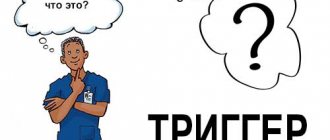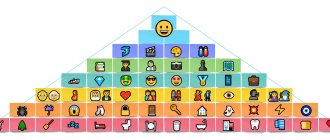The human psyche is a complex system. No matter how much it is studied, its processes still cannot be fully explained. Each person is an individual with his own worldview. However, there are general concepts that allow us to integrate our reactions, emotions and actions. One of these is the word “trigger”. This term is now familiar to many, as it is used by psychiatrists and psychologists, physicists, programmers and gamers. Let's understand a little about its meaning and what it actually says.
The English word trigger is translated as “launch”, “trigger”. In the general meaning of this concept, we can say that this is a situation, event, phrase, drawing, etc. that evokes strong emotions in you. This is an experience, often negative and painful, that comes to mind as soon as you encounter a sound, smell or other manifestations associated with the past.
A trigger in psychology is a certain stimulus, or a toggle switch, that switches our emotions, under the influence of which we are able to act unconsciously.
For example, a person may try for many years to forget about how he was humiliated at school, even work with psychologists. But once he hears the familiar voice of the offender or the very word that hurt him greatly, emotions overwhelm him again. It’s as if the person is reliving the same humiliation from childhood; he becomes sad and embarrassed. Often the trigger is panic attacks, and this can happen anywhere. At the same time, a person may not understand why this is happening to him.
Trigger - what is it?
Translated from the source - “trigger”, pistol trigger. And its action, like the flight of a bullet, is instantaneous. And after the shot is fired, the situation always changes, and radically.
The term is widely used in psychology, medicine, marketing, physics; triggers are a common word among programmers and gamers, because each topic has a specific trigger that changes the entire subsequent, seemingly calculated algorithm of behavior.
How to get rid of triggers
By knowing what triggers are, you can learn not to be influenced by them. In psychology, there are several methods that help get rid of the “triggers” that manipulate behavior.
Attention! Often the best step to get rid of triggers is to consult a psychologist.
A specialist helps you understand your inner desires and fears, free yourself from obsessive thoughts, behaviors modeled by someone else, and situations stuck inside. Freeing yourself from blocks will allow you to move forward.
However, in some cases, it is not necessary to have a deep understanding of psychology in order to get rid of the influence of triggers. You will need to work on yourself, analyze your emotions and become aware of what triggers affect you.
- Observe yourself: what causes a strong emotional response in you, irritation, outbursts of anger, or, conversely, a depressed state. Find what events or phenomena make you happy, plunge you into a state of euphoria, or spur you to take some action.
- Before you do anything, weigh your decision. Ask yourself how much you need this product or service, do you really want to act in a certain way, or is this action suggested to you by someone.
- Don't blame yourself for past mistakes, analyze them. The benefit of this activity is that you will be able to understand what emotions could push you to erroneous actions and what trigger caused them. By gaining this valuable knowledge, you can avoid making similar mistakes in the future.
- Pay attention and time to your development. This can be aimed both at the spiritual world (meditative techniques, reading books, creativity) and the physical state (stick to proper nutrition, increase physical activity).
A focus on analyzing and controlling incoming information, your internal attitude towards it and further actions will allow you not to succumb to the influence of triggers, no matter how unnoticeable it may be.
Types of triggers
In terms of the quality of their impact on a person, triggers can be both positive and negative. An external stimulus causes certain emotions, under the influence of which a person performs an action.
A positive trigger, for example, is the smell of ice cream that you ate as a child, and when you catch it, you feel good, but you don’t understand why.
The quiet cry of a child instantly wakes up a soundly sleeping mother, although she does not react to the sound of a loudly screaming TV and does not wake up.
Negative triggers cause a strong surge of emotions that can lead to inappropriate behavior. “I don’t know what came over me, why I bought seven boxes of matches...” But just a person remembers the times of shortages under the USSR and after a news program in which a cheerful presenter announced that another match factory had been closed, he was so scared that he bought up supplies...
Undesirable consequences of triggers
Most of the triggers we encounter are neutral and have little or no impact on our quality of life. But some may cause unwanted effects, such as:
- Loss of control over emotions
.
Under the influence of a trigger, you can do a bad thing or offend a person. - Susceptibility to other people's influence
.
Even an adult, in certain circumstances, can perceive another person as a mentor and be influenced by him. - Spontaneous purchases
.
Marketers often use promotions, artificial hype, fake discounts, and other triggers to get people to make unnecessary purchases. - Deterioration of health
.
Strong experiences can have a noticeable impact on well-being, reduce immunity and even lead to the development of chronic diseases.
A trigger can become a dangerous psychological trap. Sometimes a person falls into it on his own, but it also happens that all kinds of scammers and schemers try to take advantage of these vulnerabilities in our psyche. Therefore, it is important to promptly recognize the impact of the trigger and get rid of it in all available ways.
How psychological triggers are formed
You and I have well-developed sensory, auditory, olfactory and taste memory. Everything that a person has passed through the body is remembered forever, unlike knowledge that is not supported by experience. Therefore, once you taste tomato juice, you will forever remember its taste and smell.
Now imagine that while you were buying tomato juice, you were attacked and severely beaten. What will the body remember? Pain. The brain, an excellent archiver, will connect an emotional chain in a second: “Tomato juice-bullies-pain”, and will slip it to you every time you see, smell or taste tomato juice. This will form a pain trigger, and for you specifically it will be associated with a pack of juice.
If the situation goes in a different direction, for example, you fought back the bullies and defeated everyone, another emotional connection will form. And it is quite possible that you will become a fan of tomato products, because tomatoes are now a symbol of victory and courage for you.
- The smell of lilies of the valley delights my grandmother. These flowers were given to her by a boy in the 3rd grade, her consciousness forgot his name, her memory erased all the details of her studies, but the trigger remained.
- The sight of a crowd causes a passerby to panic. He was almost run over in a stadium stampede many years ago.
How triggers work
Stimuli (triggers) cause an instant reaction in a person. Its consequences depend on the type of temperament, state of the nervous system, psychological mood, experience and life situation at the moment.
- The man inhaled the smell of rare perfume and a memory of his beloved woman surfaced.
- You heard a long-forgotten melody and remembered your school graduation and your first kiss.
- Someone caught the smell of sprats and a lump appeared in his throat - a memory of poisoning with this product surfaced in his memory.
- The habit of smoking a cigarette after a cup of coffee makes you want to smoke as soon as your nose catches the aroma of this drink.
- If you were bitten by a dog as a child, you may perceive with fear a harmless puppy running up to sniff your leg.
- The victim of a car accident heard the squeal of brakes somewhere in the distance, which triggered a memory of that sound a second before impact.
When a trigger is triggered, a person’s perception changes and he enters the emotional state in which the trigger was generated. At such a moment, the sense of reality is distorted and the person is capable of inappropriate actions.
Triggers in medicine
As in psychiatry, triggers in medicine also act as a provoking factor, under the influence of which certain processes are launched in the body. But unlike psychology, in medicine the term “trigger points” is common, which can be found on the patient’s body. These are local areas of spasm, in which a sensitive area is formed in the muscle. If you touch a trigger point, the body reacts sharply with sharp, shooting pain.
In hypnosis, the term trigger refers to a keyword that either puts the patient into a hypnotic state or activates a specific program laid down during hypnosis.
Common Triggers
In addition to the example discussed with a person who survived a car accident, there are other triggers that occur quite often. Many of them are not associated with shocks, but affect our behavior in certain situations.
The most common triggers include:
- Human scream
.
A loud scream provokes a surge of adrenaline because it is associated with danger. This reaction occurs instantly - much faster than we have time to assess the situation and understand who shouted and why; - A dog growling or barking. This trigger occurs in people who have been attacked by a dog in the past. Such an event can leave a deep emotional mark, and in the future, hearing a dog growl or bark, a person will fall into a state of anxiety;
- A line or crowd showing interest
.
Seeing a large queue or simply interested people, we also experience strong interest, afraid of missing something important; - Feelings associated with important memories
.
A melody, taste or smell can evoke a feeling of nostalgia, making you remember your first kiss, prom dance or other powerful emotion.
The influence of most triggers ceases almost immediately after the stimulus disappears or it is realized that the reaction was erroneous. For example, having realized that a child screamed for joy, we immediately perceive his cry differently. In psychology, such a trigger is called neutral because it does not entail serious consequences.
What is a trigger in simple words for gamers?
Every computer game has a set of triggers that make the game dynamic and intense. Using triggers changes the picture, moves the game object, shoots and explodes.
In simple words, a trigger in a game is buttons that, for example in STANDOFF2, will allow even a beginner to become super cool... Triggers can be sold and, accordingly, bought.
The gamer, in most cases, independently chooses when to introduce a trigger into the game, that is, to change the situation - shoot, fly away, introduce a monster onto the field, etc. In addition, there are related terms in gaming:
- Trigger zone is a section of the playing field in which an object is tracked.
- Trigger point - a verified distance when you can turn on the trigger.
If we focus specifically on gamer triggers, we can write a library, but in short, the essence is clear.
The nature of triggers
Can only fears experienced in childhood cause triggers?
Many of the emotional triggers come from perfectionism. We're embarrassed to admit that we get angry when a colleague gets a promotion. Or when our best friend gets pregnant for the second time and we're still struggling with fertility.
Regardless of the topic that causes you these unpleasant feelings, you need to stop being ashamed of them. Try asking yourself, “What is it about this person's experience or capabilities that makes me so angry?”
If we can ask ourselves this question, we are more likely to begin to discover our emotional triggers.
A trigger can be caused not only by negative, but also by positive emotions.
For example, the smell of perfume “elusive to consciousness” can mentally return us to a romantic moment from the distant past.
Triggered - they got you
The term literally means a person who has been “gotten.” The trigger has worked, you give in, get wound up and walk “on edge”. The term gained popularity after things like memes spread on the internet.
Most often, these three-dimensional pictures (memes) convey negative emotions when a person is “turned on.” The first picture shows a trigger - a provoking factor, it can be a word or an object; pictures 2 and 3 already show the triggered reaction.
At first, it was a joke among bloggers aimed at people who exhaust themselves with diets, or, conversely, cannot lose weight. When the bloggers' jokes turned to the feminist movement, the triggered person appeared - Chanti Binks, a red-haired girl with glasses.
Each of us has something that can be “triggered” or, in Russian, something to mock and ridicule. The question is whether such evil jokes are necessary that increase hatred, irritation and melancholy. Maybe it’s better for bloggers to focus their energy on making the Internet cleaner and better, and not turn it into a trash heap???
This is what it is - a trigger, in simple words and not so much, in medicine and copywriting. If the material was useful to you, you liked the article, do not forget to rate it and share it on social networks, with respect, S.K.
Triggers as part of marketing.
As for marketing, it is far from a secret that the art of selling is very closely tied to human psychology. And marketers are very sensitive to the study of all sorts of weaknesses of the human psyche, thanks to which they can successfully sell products. You may not have even thought about it, but you've probably already purchased products dozens or even hundreds of times under the influence of these same triggers.
So, in marketing, a Trigger is a special active “trick” designed to push a potential client to make a purchase.
Here are some of the most common marketing triggers:
- Site search. When you view products on the site, you may be shown a block with similar content: “You recently looked at this, maybe you might be interested in these items?” Here they are trying to sell you an alternative or related product.
- A basket of procrastinators. For example, in an online store you added several items to the cart, but did not complete the purchase for a long time (you think, look for cheaper elsewhere, etc.). You may be shown a message that, due to the fact that you are such a great customer or simply caught a promotion, delivery will be free for you. Or something like that. In this case, you are being pushed to place an order and not look for alternatives.
- Hot deals. Both in a brick-and-mortar store and online, you've obviously noticed all sorts of hot or popular deals. Well, how can you miss this??? People take it!!! So this is something good. Give it to me too!!! Two please.
- Promotions with a limited time or quantity of goods. Well, everything is clear here, how can you not buy this wonderful frying pan for only 9.99 and there are very few of them left.
As you already understand, marketers have a lot of similar tricks. They target all our feelings and emotions: greed, curiosity, the desire to be first, “frugality” and so on. Everything is your favorite, the most important thing is that you buy it.
What is this on Instagram
Instagram is a social network that almost every Internet user knows about. Using the application, a person gets rid of boredom. After all, here you can find entire stores, a lot of entertainment content, learn about the lives of your friends and celebrities, and just watch funny videos, relaxing after a hard day.
Gradually, a person is drawn into this social network and can no longer live without it. Soon the fear of missing out on new publications and comments will begin to appear, which will cause stress. Instagram itself creates a number of habits among its users.
This application itself is an external trigger. How often does it appear on the page of other social networks? How often do friends and relatives refer to this portal? A person, willy-nilly, is imbued with Instagram, stepping towards the already internal triggers. Now the application itself hides a call to a particular action. More often, this can be found in various sweepstakes and store accounts.
In electronics
Any storage device cannot do without a trigger. This is the main element of any system of such a device. Most often, triggers store a small amount of information. Typically, this includes various codes and bits.
Triggers are classified as RAM due to the fact that they retain their memory if there is an element that will power them.
There are many types of triggers in electronics. Different types can be found in different devices. Most often it is used to create and transmit a signal.
Video about what a trigger is in electronics:











